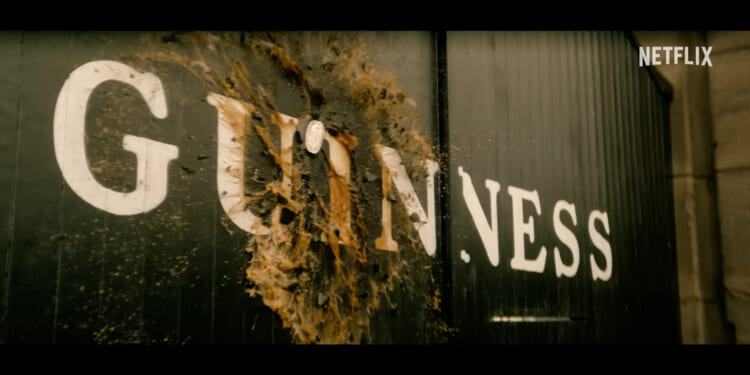When Peaky Blinders stormed onto screens, it was electric — a masterclass in charisma and carefully-controlled chaos. Steven Knight turned Birmingham’s gangland into myth. Every frame felt soaked in smoke, blood, and poetry. So when Netflix announced House of Guinness, written by the same man, expectations were sky-high. This was supposed to be Peaky Blinders with porter. Instead, it’s like going from dating Sydney Sweeney to sharing a bed with Charlie Sheen.
Knight has taken one of Ireland’s richest dynasties and poured it through the world’s cheapest filter: the postcard stereotype. The show reeks of artificial shamrocks and fake sentiment. It’s the cinematic equivalent of a souvenir T-shirt reading Kiss Me, I’m Irish.
Take the Fenians, for instance. The 19th-century Irish revolutionaries fought for independence. They smuggled weapons and stirred rebellion. In Knight’s hands, they’re reduced to cartoonish thugs with atrocious accents. History becomes pantomime. These men who risked hanging for freedom now sound like extras from Braveheart on a lunch break. The dialogue is littered with howlers like “bonehead” — a term no Irishman has ever uttered in his life. It’s the same breed of nonsense as “Top of the morning to ya,” a phrase that exists only in the fevered dreams of visiting Americans and Guinness commercials from 1984.
The show’s Dublin feels as authentic as a leprechaun keychain sold at JFK Airport. Every emotional beat lands with the grace of a pint glass to the head. It’s not Ireland — it’s Ireland™.
What makes this so infuriating is that Knight knows better. Peaky Blinders was tight, menacing, and meticulously crafted. Tommy Shelby was Hamlet with a razor blade. The writing sliced through cliché. House of Guinness does the opposite. It’s built entirely from them. The characters aren’t people, they’re PowerPoint slides: “Strong-willed woman,” “idealistic heir,” “simmering revolutionary.” They explain themselves like tour guides, lecturing us about themes …
House of Guinness: Netflix’s Biggest Show of the Year Is a Total Disgrace | The American Spectator
Related Posts
Rayner Returns With Plot to Save Beloved Employment Rights Bill – Guido Fawkes
Angela Rayner is emerging from cryosleep to agitate over her beloved Employment…
Labour Finally Acknowledges Lucy Powell’s Existence – Guido Fawkes
After ignoring its own Deputy Leader since the day she cruised to victory,…
Mark Warner and Eric Swalwell Are Hoping the U.S. Military Will Rescue America From Trump – Twitchy
If Democrats sound like they’re hoping for a military coup in the U.S.,…
INGERSOLL: It’s Time To Put The Feminine Policy Regime On A Train To Nowhere
Greetings, Dear Reader, Welp, as promised. TRAINS FOR WOMEN In one of my many…
Israel blocks a Canadian delegation from going to occupied West Bank
OTTAWA, Ontario — Israel on Tuesday blocked a private Canadian delegation that…
OBR Officials Face MPs Without Richard Hughes – Guido Fawkes
The Commons Treasury Committee has a session with the Office for Budget…
Florida Officer Shot Twice in the Face During Service Call; Suspect Killed [WATCH]
A Port St. Lucie police sergeant was shot in the face Monday evening while…
Mike McDaniel Admits Stephen Ross ‘Really Frustrated’ In One Of Most Dysfunctionally Intimidated Ways Possible
What the hell has happened to this guy? Stephen Ross, the owner of the Miami…
Having Your Church Stormed by Radicals is ‘Just Something You’ve Gotta Live With’: MN AG Ellison [WATCH]
Minnesota Attorney General Keith Ellison appeared Monday on a livestream hosted…
DOJ Warns Pelosi, Other California Democrats To ‘Stand Down’ Or Face Consequences For Threats To Arrest Feds
Department of Justice (DOJ) Deputy Attorney General Todd Blanche warned…








![Florida Officer Shot Twice in the Face During Service Call; Suspect Killed [WATCH]](https://www.right2024.com/wp-content/uploads/2025/12/Inmate-Escapes-Atlanta-Hospital-After-Suicide-Attempt-Steals-SUV-Handgun-350x250.jpg)

![Keith Ellison Caught Promising to Fight State Agencies for Somali Fraudsters [WATCH]](https://www.right2024.com/wp-content/uploads/2026/01/Keith-Ellison-Caught-Promising-to-Fight-State-Agencies-for-Somali-350x250.jpg)






